The most common form of cancer found in the kidney is Renal Cell Carcinoma (RCC). RCC accounts for 85 percent of kidney tumors. But within RCC there are different subtypes. The latest World Health Organization (WHO) classification of kidney tumors includes 18 different subtypes and that list is expected to expand when the new update is published.
This page describes the some of the more common subtypes of RCC. Knowing your subtype is important because it could impact decisions about surveillance and treatment. If you’ve been diagnosed with kidney cancer, ask your doctor what type of RCC you have.
Clear Cell
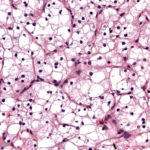
Clear Cell Renal Cell Carcinoma is the most common form of RCC. About 70 percent of patients with RCC will have this histology. Because it’s more common, there is more knowledge and research about this subtype and doctors tend to have a better understanding about treating it.
Papillary
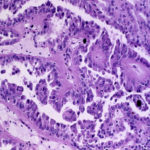
Papillary Renal Cell Carcinoma is found in 10 to 15 percent of patients diagnosed with RCC.
Chromophobe
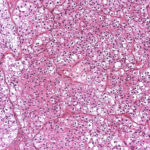
Chromophobe Renal Cell Carcinoma is a rare subtype accounting for about 5 percent of RCC tumors. This histological type is usually less aggressive than other types of RCC. Chromophobe tumors can grow quite large without spreading to other parts of the body.
Translocation
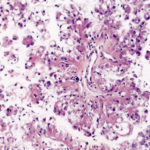
Translocation renal cell carcinoma (TRCC) is a rare subtype occurring in 3 to 4 percent of patients. Initially found primarily in children, more cases of TRCC in adults are being found. Unlike other forms of RCC, TRCC is more common in women. This subtype can indicate a more aggressive course.
NOS
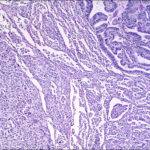
NOS or not otherwise specified Renal Cell Carcinomas represent about 3-4% of all RCCs. This subtype is found where multiple variants or subtypes are seen in a single tumor. There could be a mixture of 2 to 3 different subtypes found. Unclassified RCC is sometimes associated with more aggressive disease.
Renal Medullary
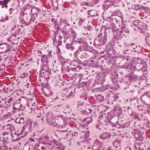
Renal Medullary Carcinoma (RMC) is a rare and aggressive form of kidney cancer. It’s more commonly found in younger adults who carry the sickle cell trait. Because of the rare and aggressive nature of RMC, it’s important for patients to seek treatment with doctors who are familiar with the disease.
Collecting Duct
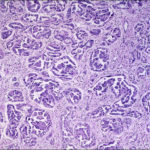
Collecting Duct Carcinoma (CDC) is also sometimes referred to as Bellini Duct Carcinoma. CDC is a rare form of RCC accounting for less than 3 percent of cases. Collecting duct is an aggressive form of kidney cancer and because of its rarity, treatment options are more limited.
Clear Cell Papillary
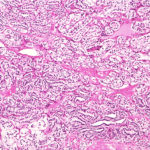
Clear Cell Papillary Renal tumor is a rare subtype accounting for less than 3 percent of diagnoses. The latest WHO update changed this classification from carcinoma to renal tumor to reflect the fact that no cases of metastases for this subtype have been documented.
Cystic

Cystic Renal Cell Carcinoma (CRCC) is an uncommon subtype of renal cell carcinoma, occurring in 2.5% of cases. CRCC is very unlikely to metastasize (spread to other organs) and carries an excellent prognosis following surgery.
There are other types of tumors that can grow in the kidney, including sarcomas, lymphomas, transitional cell carcinoma, Wilms tumor, and metastases from other cancers. This resource is only designed to discuss types of renal cell carcinomas. If you’ve been diagnosed with another type of tumor in the kidney, we encourage you to seek out more information for those indications.
